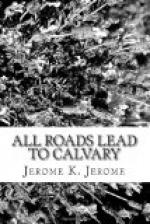“It wasn’t so incongruous at the time,” he answered. “My father had sent me out to America to superintend a contract. It was the first time I had ever been away from home, though I was nearly thirty; and all my pent-up youth rushed out of me at once. It was a harum-scarum fellow, mad with the joy of life, that made love to her; not the man who went out, nor the man who came back. It was at San Francisco that I met her. She was touring the Western States; and I let everything go to the wind and followed her. It seemed to me that Heaven had opened up to me. I fought a duel in Colorado with a man who had insulted her. The law didn’t run there in those days; and three of his hired gunmen, as they called them, held us up that night in the train and gave her the alternative of going back with them and kissing him or seeing me dead at her feet. I didn’t give her time to answer, nor for them to finish. It seemed a fine death anyhow, that. And I’d have faced Hell itself for the chance of fighting for her. Though she told me afterwards that if I’d died she’d have gone back with them, and killed him.”
Joan did not speak for a time. She could see him grave—a little pompous, in his Sunday black, his footsteps creaking down the stone-flagged aisle, the silver-edged collecting bag held stiffly in his hand.
“Couldn’t you have saved a bit, Daddy?” she asked, “of all that wealth of youth—just enough to live on?”
“I might,” he answered, “if I had known the value of it. I found a cable waiting for me in New York. My father had been dead a month; and I had to return immediately.”
“And so you married her and took her drum away from her,” said Joan. “Oh, the thing God gives to some of us,” she explained, “to make a little noise with, and set the people marching.”
The little flame died out. She could feel his body trembling.
“But you still loved her, didn’t you, Dad?” she asked. “I was very little at the time, but I can just remember. You seemed so happy together. Till her illness came.”
“It was more than love,” he answered. “It was idolatry. God punished me for it. He was a hard God, my God.”
She raised herself, putting her hands upon his shoulders so that her face was very close to his. “What has become of Him, Dad?” she said. She spoke in a cold voice, as one does of a false friend.
“I do not know,” he answered her. “I don’t seem to care.”
“He must be somewhere,” she said: “the living God of love and hope: the God that Christ believed in.”
“They were His last words, too,” he answered: “’My God, my God, why hast Thou forsaken me?’”
“No, not His last,” said Joan: “’Lo, I am with you always, even unto the end of the world.’ Love was Christ’s God. He will help us to find Him.”
Their arms were about one another. Joan felt that a new need had been born in her: the need of loving and of being loved. It was good to lay her head upon his breast and know that he was glad of her coming.




